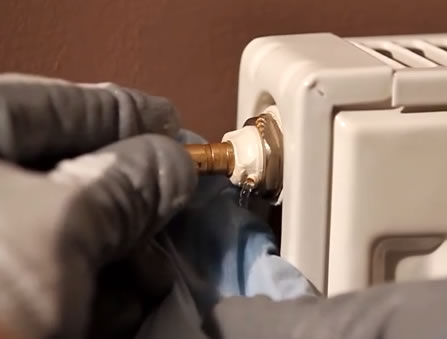Radiators are extremely common and the majority of UK homes have a central heating system featuring radiators in every room. When radiators are working efficiently, as soon as the central heating comes on they begin to heat up until every part of the radiator is hot. Unfortunately, over time gas and air pockets can develop inside radiators, which reduce their efficiency. This also applies to heated towel rails as they also operate the same way as conventional radiators. So if your radiators are not performing properly, here is a simple guide to bleeding a radiator.
How to Tell if a Radiator Needs Bleeding
When a radiator is piping hot from top to bottom, it is working efficiently. If, however, your radiators are hot at the bottom and cooler at the top, they probably have air and gas trapped inside them. Thankfully you don’t need to call in a plumber as bleeding radiators is a simple DIY task anyone can do.
In order to bleed a radiator, you need to open up the bleed valve, but before you do this, make sure you know which radiators in the system are affected. Since air normally rises, it is more common for upstairs radiators to require bleeding. The simplest way to check is to turn the central heating on and leave it until every radiator in the house is hot. Next, check each radiator for cold spots, but be careful not to burn your fingers in the process.
How to Bleed a Radiator
- Turn the central heating off and wait for the radiators to cool down
- Check what type of valve your radiators have – older radiators need a radiator key whereas new ones can be bled using a flat-head screwdriver
- Place a cloth under the valve to catch liquid
- Turn the valve anti-clockwise – if you hear a hissing sound, air is escaping
- As soon as liquid begins to leak out, close the valve up again
- Check the water pressure in your boiler and if necessary, top it back up
- Turn the central heating back on and check the affected radiators to ensure they are now working properly
How Often Should I Bleed My Radiators?
Radiators should be checked once a year. In most cases this will be sufficient to ensure they are working at their most efficient, but if you have had plumbing work done, it is a good idea to check them once work has been completed as air can get into the system, particularly when radiators have been removed from the central heating circuit.
If you notice that air is getting into the radiator system more frequently, have your central heating checked out by a qualified engineer because there is a problem that needs fixing.
What Not to Do
Always use a cloth to protect the area beneath the radiator valve—water inside a radiator is usually very dirty and will almost certainly stain your floor if it is allowed to squirt out everywhere. Finally, don’t forget to tighten up the valve once you have let any air out. Leaking radiators can cause a lot of damage to flooring.

